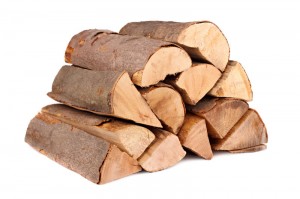With the start of November, the fall season is nearly halfway over. That means warm weather is only a distant memory for this year. Many parts of the country have even received snow already, and everyone is thinking ahead to staying warm for the upcoming winter forecasted to be frigid like last year. For some homeowners, that means stocking up on firewood to make the best fire in the fireplace or wood-burning stove, and picking out firewood is not as simple as loading up the first stack in the lumberyard.
The main decision in choosing firewood is whether you want a hardwood or softwood. Hardwood trees are also known as deciduous trees, and they grow all over the country. These woods are generally very dense, so they burn much hotter than softwoods. This leads to more cost efficiency because hardwoods create slow-burning, hot fires. On the downside, hardwoods can be difficult to start a fire with because of their density. They also require one or two years of seasoning, in which they sit in a dry, indoor area to fully lose all of the moisture inside. Hardwood trees include species like oak, hickory, hard maples, and birch. Oak is the hardest, densest wood, and it burns the hottest. However, it usually needs closer to two years to season. Birch, on the other hand, is the least dense, and it burns quickly, often without leaving a bed of hot coals behind.
The other type of wood is softwood, also known as coniferous trees, and this variety includes species like fir and pine trees. Softwoods tend to light on fire very quickly, but they also burn quickly and at lower temperatures, which makes them ideal for starting a fire but not for sustaining one. This type of wood also creates the crackling noise many enjoy from a wood-burning fire because of the large quantity of sap inside. However, these sparks mean energy from the fire is wasted on boiling the liquid, instead of being used for creating heat, making this wood less energy efficient. The sparks also lead to a higher production of creosote, a carcinogenic material that can cause unintentional fires if allowed to build up. Softwoods season more quickly than hardwoods, though, which makes them good options for last minute firewood purchases.
Choosing the right firewood far enough in advance to ensure proper seasoning can pose some challenges even to experienced firewood buyers. However, a good measure to take is to buy a variety of well-seasoned hardwoods and softwoods from a local supplier, and store all of it in an outdoor space protected from the elements. If you have questions about choosing and storing your firewood, contact New Buck Chimney Services out of Shreveport, Louisiana. These chimney and fire experts can help point you in the right direction.

